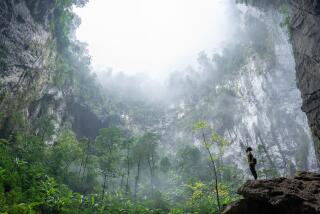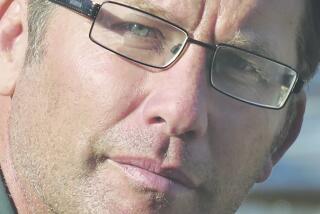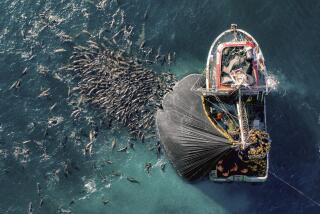The World Has Its Mysteries
- Share via
Early in the BBC-Discovery Channel documentary “State of the Planet With David Attenborough,” the narrator marvels at the sight of a heretofore unknown species: the black-faced marmoset of the Amazon rainforest.
“We have no idea how this animal lives or what kind of social interactions take place in its group,” says Attenborough, his voice flushed with excitement. “It has yet to be studied.”
Later the globe-hopping Sir David--he’s seen traveling by helicopter, plane, hot-air balloon, ship, truck and shank’s mare--takes us to the butterfly-thick mountains of New Guinea.
Natives make a living by capturing rare butterflies with wingspans up to 12 inches. They have learned to regulate their hunting patterns as part of a “butterfly farming cooperative” aimed at keeping butterflies from being hunted into extinction.
“The people and the butterflies in these mountains have a more secure future” as a result, says Attenborough, approvingly.
The marmoset and butterfly vignettes are “State of the Planet” at its best.
Ditto for a trip to depopulated Easter Island, an underwater look at damage inflicted by El Nino on the reefs of the Maldives Islands in the Indian Ocean, a visit with save-the-elephant activists in Kenya and more.
Leisurely, didactic, well-reported and visually appealing, the three-hour documentary is a good primer on many of the problems and promises of the modern planet. Shaggy-haired and engaging, Attenborough is a perfect guide.
Alas, however, “Planet” cannot resist the temptation common to much environmental reporting: the apocalyptic prediction, the syndrome of the-world-is-going-to-hell-because-of-man.
For much of the middle hour, Attenborough is pushing a thesis that the world is heading toward a mass die-off of species as catastrophic as the meteor collision that killed off the dinosaurs and plunged the world into an ice age.
Although there’s nothing wrong with a provocative viewpoint to keep a story moving, a few doubters or naysayers thrown into the mix would seem sporting.
Luckily there’s kind of a reverse Gresham’s law at work: The good reporting drives out the overblown conclusion-drawing.
Early on, Attenborough notes that nobody really knows how many species live on the planet; could be 1.5 million, could be 100 million. With foggy numbers like that, it is hard to make stick a view that the world is on the cusp of a mass extinction.
And after a detailed examination of how snails imported to Hawaii have over decades virtually eliminated the native species of snails, Attenborough has to concede that nobody has been able to find an environmental downside to the snail war.
A safer--although less splashy--thesis is that man is messing with the environment in myriad ways with little idea what the impact will be.
“We’re just beginning to understand the magnitude of our ignorance,” says Sylvia Earle, former chief scientist with the National Oceanic and Atmospheric Administration.
When Attenborough lets fly with a buckshot like “the damage we have inflicted on the world’s environments has led many to question whether the human species is deliberately destructive,” even his own experts try to rein him in.
Harvard professor Edward Wilson follows by suggesting that it is a “grave injustice to speak of the human species in some sense as evil.”
As befits a BBC production, there are Britishisms. John Lawton, professor at Imperial College in London, warns that the world is becoming “grottier,” British slang for disgusting and nasty.
“Planet” has its villains, made in the USA: Los Angeles freeways and big-time, American-style agriculture. Whenever the latter is shown, farm equipment is racing at a voracious speed.
Younger viewers, unfamiliar with his decades as a BBC headliner, may note that David Attenborough looks and sounds like his brother Richard, who starred as the dino-magnate in “Jurassic Park.”
Now there’s a man who learned the downside of tinkering with nature.
*
“State of the Planet With David Attenborough” can be seen at 8 tonight on the Discovery Channel.
More to Read
Sign up for Essential California
The most important California stories and recommendations in your inbox every morning.
You may occasionally receive promotional content from the Los Angeles Times.













